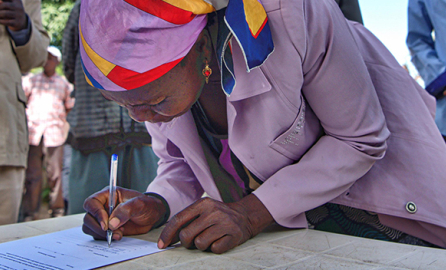The updated Budget Support Guidelines, introduced in October 2017, encompassed changes to the modality and a streamlining of existing procedures. Grounded in a logic of dialogue and partnership, budget support accounts for about 40% of EU’s bilateral cooperation. The guidelines promote the ownership of development cooperation by national parties, while ensuring transparency and accountability throughout the process.
Trainings in Brussels, across regions, and online, serve as important tools in facilitating the implementation of the updated guidelines. Since the last edition was issued in 2012, many new developments have had to be factored in. We talked to three attendees, coming from EU Delegations to the Gambia, Afghanistan and Uganda, to ask about their experiences and what the update of the guidelines means for their work.
First impressions
| The EU disburses €1.7 billion a year through budget support to some 90 countries and territories around the world. For more on the updated guidelines, see our piece on the introduction of the 2017 Budget Support Guidelines here. |
For Thomas Tiedemann, Head of Section for Governance and Human Rights at the EU Delegation to Uganda, the training comes as a first. Having begun working with the Delegation in 2016, he was tasked with developing a Sector Reform Performance Contract (SRPC) for governance. With the Financing Agreement signed in December 2017, the year ahead will see the beginning of its implementation.
Having previously worked in countries where budget support was not employed – such as Eritrea, where a public budget was lacking altogether – the training provided Tiedemann with a community of practice to draw from.
“Not everyone has experience with the modality, so it’s important to make use of that network and stay in touch with other delegations if you have any questions on implementation,” explained Tiedemann.
“The guidelines are really quite comprehensive,” he said, noting that delegations nevertheless have to find ways to adapt to country-specific contexts.
Making it easier to get right
“If you want to do budget support right, I think it’s quite a labour intensive modality,” Tiedemann explained, referring to the assessment stages that need to be conducted, from looking at eligibility criteria to analysing performance indicators linked to variable tranches.
“Not everyone has experience with the modality, so it’s important to make use of that network and stay in touch with other delegations”
“I think it’s a useful modality to have in the overall mix,” he said, despite the monitoring and reporting it requires. The new guidelines will help reduce some of the more cumbersome elements of budget support, which he believes will make things easier for delegations on the ground. “My colleagues with previous experience in budget support will likely be happy about the simplifications.”
He added that all aid modalities present challenges. “Thinking of policy dialogue, there’s always the question of leverage in terms of what level of resources you provide to the government budgets.” He also noted the availability of government counterparts in policy dialogue processes as a key factor affecting the level at which engagement can be pursued – and an important element in ensuring a successful implementation.
Watch Thomas Tiedemann reflect on implementing budget support in Uganda and the benefits of the new guidelines here:
“It’s also good to share parts of the guidelines with our government counterparts because it explains the rationale for budget support and the principles behind it, along with its merits,” he said.
A better framework
A representative of the EU Delegation to Afghanistan who recently coordinated a budget support training course in Kabul for the Delegation and members of the government explains that Afghanistan is currently being assisted by a budget support operation totalling €204 million. “When you have a contract that large, it becomes the overarching umbrella for policy dialogue between the EU and the government,” he said.
Given the size of the programme, the 2017 guidelines have had a notable impact. “For us in the Delegation, they make our life easier,” he said. “They facilitate and accelerate the work and processing of a budget support contract.” He gave the examples of the ability to increase the number of variable tranche indicators, or to increase the duration of a budget support programme.
“Afghanistan presents a good study for how a budget support contract should be handled”
According to him, the changes to the content will allow countries to better address their development challenges, as they are intended to align budget support with elements of the Sustainable Development Goals, the Busan Partnership for Effective Development Co-operation and the New Deal for Engagement in Fragile States.
This representative corroborated Tiedeman’s experience that budget support operations require a high degree of coordination. For him, hosting periodic trainings – not just for delegation members, but also government counterparts and donor agencies –8 can ensure that contracts proceed smoothly, counteracting the loss of institutional knowledge created by high turnover rates.
While the guidelines provide solid prescriptive measures, he emphasised the need for a continuing dialogue with country delegations in developing future iterations of development tools and methodologies.
“Afghanistan presents a good study for how a budget support contract should be handled,” he added, referring to the 2016-2018 period, during which half of the committed budget support was disbursed. The next disbursement will be paid out over the coming year.
Possible improvements
Josselin Amalfi, Programme Manager at the EU Delegation to the Gambia, attended the training in support of the development of a new action document and of a payment file, set to be completed by mid-2018.
The updated guidelines have simplified both of these processes, Amalfi explained, while the update will further help task managers and decision makers alike. The simplification of the payment file and the Public Financial Management annex, for instance, means that less time will be spent systematically searching through documents.
Amalfi further emphasised the usefulness of the updated guidelines in providing the possibility of combining Sector Reform Performance Contracts and State and Resilience Building Contracts. He said the EU Delegation to the Gambia has been considering the possibility of employing two budget support operations, and might use the increased flexibility of the 2017 guidelines to encompass both under a single plan.
Watch Josselin Amalfi explain key takeaways from the budget support training here:
While the core content of a budget support contract remains standardised across delegations, Amalfi said that the ability to add complementary information, such as reports from the government, development partners and civil society, would help provide a more holistic representation of the country situation.
Amalfi welcomed the introduction of the concept of resilience, to what used to be called State Building Contracts, under the new State Building and Resilience Contracts. He said more work needed to be done, however, on clarifying the concept of resilience on the societal level, along with including modes of achieving this, for example, through support to civil society under a budget support framework.
Image credit: Danilo Barbero
This article was written by Craig Hill, Journalist and Content Editor at Capacity4dev, with input from DG DEVCO.






Log in with your EU Login account to post or comment on the platform.